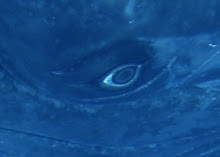Hardy Jones: 1943-2018
Marine Wildlife Conservationist and Filmmaker
Friday December 15,
2018
By Howard Hall
In 1983, hovering over
a seamount in the Sea of Cortez, I trained my underwater 16mm movie camera on a
giant manta ray that trailed a tangle of heavy fishing line and long-line
hooks. Descending through a cloud
of scuba bubbles, Hardy Jones landed on the ray’s back, pulled his dive knife
from the scabbard strapped to his leg, and began cutting the line free. Had the ray bolted, Hardy might have
been impaled by the lone-line hooks and dragged away into the depths beyond the
seamount. But he never hesitated
and the ray seemed to sense his intentions. Soon Hardy had cut away the lines and he ascended to the
surface whooping and hollering with joy as he held the nest of hooks and lines high
over his head. He had saved the
manta and nothing could have given him more joy. This is how I knew Hardy Jones and it is but one of many
moments I shared with him never to forget.
In 1978 Hardy Jones
walked away from a promising career in journalism and began pursuing a life
devoted to the study and protection of dolphins. This decision had a profound effect on many lives including
mine. Some of those lives were the
thousands of dolphins he saved.
Others were like me, who was inspired and eager to follow Hardy as he
fell ever more deeply in love with ocean wilderness and its amazing
inhabitants.
After graduating from Choate and Tulane Universities, Hardy was
employed by WNOE radio in New Orleans and, later, for United Press
International, The Peruvian Times, and CBS News. But at some point in the mid-1970’s Hardy became fascinated
with the minds of cetaceans. When
he heard about a pod of spotted dolphins that regularly visited and interacted
with a team of treasure divers in the Bahamas, Hardy dropped everything,
assembled a small crew of divers and set off to study and film the
animals. Since 1978, when Hardy’s first
film, Dolphin, was released,
thousands of divers, scientists and underwater filmmakers have visited the
Bahamas Banks to study, photograph, and swim with these animals.
Hardy’s fascination with dolphins soon led to outrage has he
became aware of fisheries that targeted these intelligent animals. In 1979 and again in 1980 I followed
Hardy to Japan to document the killing of dolphins by Japanese fishermen. During that second trip, Hardy became
the first Westerner to stand on the beach as Japanese fishermen killed hundreds
of bottlenose dolphins and pilot whales.
Within 24 hours the 16mm film he captured that day appeared on the CBS
evening news and was immediately syndicated worldwide resulting in formal
letters of protest to the Japanese government. During the years that followed, Hardy made numerous trips to
Japan in efforts to curtail the killing.
In some cases, Hardy’s efforts led to the release of dolphins that had
been herded into bays and trapped for slaughter. I was in Taiji, Japan with Hardy when he negotiated the
release of several hundred of melon-headed whales.
During the years that followed, Hardy produced more than 70
conservation films for broadcasters that include PBS, Discovery, TBS and
National Geographic. One especially
powerful film, If Dolphins Could Talk,
hosted by actor Michael Douglas, included footage of dolphins dying in tuna
nets. The film’s impact led the H.
J. Heinz Company, owner of the Star-Kist brand, the Van Camp Seafood Company,
which markets Chicken of the Sea tuna, and Bumble Bee Seafoods Inc., to
announce that they would stop buying tuna that is caught in nets that also trap
and kill dolphins.
''Dolphin-Safe'' labels on tuna cans are a direct result of Hardy’s
film.
In 2000, Hardy was joined by film actor/ocean activist, Ted
Danson, in founding BlueVoice.org, an organization dedicated to the protection
of dolphins and whales. In recent
years the organization’s focus has been to end the brutal slaughter of dolphins
in Peru, where as many as 15,000 dolphins are killed yearly for use as shark
bait as well as human consumption.
The campaign has included filming expeditions that returned with graphic
photographic evidence of massive illegal hunts for dolphins. Additionally, undercover surveys
revealed the illegal sale of dolphin meat in violation of dolphin protection
laws. Hardy’s efforts and those of
BlueVoice.org have recently resulted in new laws forbidding the harpooning of
dolphins for shark bait. The
Peruvian campaign is documented in Hardy’s most recent film, The Killing Feather, which he finished
just a week before his passing.
In 2011 Hardy authored The
Voice of the Dolphins. The
book recounts more than thirty years of work with dolphins in the wild, and the
efforts of BlueVoice.org to end the killing of dolphins worldwide. The book also reveals the increasing
menace of chemical contaminants in the marine food chain.
Hardy’s commitment to ocean conservation was intense and his
accomplishments were profound. But
for those of us fortunate enough to know him, Hardy was an intelligent gentle
man who was great fun to be around.
He loved being surrounded by ocean wilderness and the mysteries of life
it held. And his enthusiasm was
extremely contagious. To me he was
far more than a film producer for whom I enjoyed working on many occasion. He was a close and caring friend.
Hardy’s numerous awards include the 2005 Filmmaker of the
Year Award from Filmmakers for Conservation, a Lifetime Achievement Award from
the International Wildlife Film Festival, the Genesis Award of the Humane
Society of the United States, the Special Jury Award of the Explorers Club, and
a NOGI Award from the Academy of Underwater Arts and Sciences
Hardy passed away on December 12, 2018 after a
long battle with multiple myeloma.
He is survived by his wife Deborah Cutting and his sister Betsy Jones.





